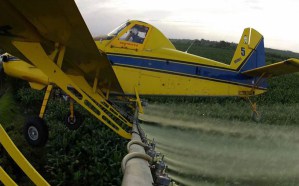A new study has found alarmingly high levels of pesticides in the urine of pregnant Costa Rican women working in and living near the banana industry in Matina, Limón. The chemical ethylene thiourea (ETU) found in the fungicide mancozeb, which is sprayed over banana plantations here, can be detrimental to fetal brain development, according to the report released Monday in Environmental Health Perspectives.
The study registered 451 pregnant women and tracked urine samples from 445 to test their level of exposure to ETU. Expecting mothers had levels of ETU in their urine five times greater than the general population, exceeding reference doses for the chemical. ETU levels were significantly higher for women living less than 50 meters from a banana plantation. Seventy two percent of the women surveyed had on average 45 percent higher levels of the chemical in their bodies than women who lived more than 500 meters away. The report also noted higher levels in women who washed agricultural work clothes one day before samples were collected; women who worked during pregnancy; and immigrant women.
Mancozeb is a common agrochemical used on a variety of crops here and around the world. The fungicide is registered with the Plant Health Department for use on bananas, plantains, peppers, beans, potatoes, watermelons and tomatoes, among other foods.

Berna van Wendel, a professor with the National University’s Central American Institute for Studies on Toxic Substances, which conducted the study, told The Tico Times that the problem did not just affect workers at the plantation but the wider community as well. The report argued that the inverse relationship between ETU exposure and distance from the area where the fungicide was applied suggested that aerial exposure was the most likely source of the chemicals.
“Few women work in the agricultural sector, which led us to believe that this is a problem for the wider environment,” van Wendel said, noting that direct exposure is not necessary to see elevated levels of ETU in the body.
“The weather is hot and their homes are build to let the air in. It’s not easy to avoid contact with these chemicals so we suggested reducing the amount of chemicals at the source,” she said.
Van Wendel said that other countries, like Argentina, required a 500-meter buffer between the community and the field where crop dusters work. The report recommended reducing the frequency of aerial applications, using application methods that keep agrochemicals from drifting into the community, and that clothes used in the fields not be washed at home.
“It’s important to review the current legislation on required distances for the application of pesticides by air,” she said, noting that several people interviewed in their research complained about the crop dusters buzzing the banana fields near where people live.
Sergio Laprade, coordinator for the National Banana Corporation, CORBANA, told The Tico Times that the trade group took the report seriously but had some concerns with its conclusions.
The CORBANA representative clarified that women are not allowed to work with agrochemicals after they report that they are pregnant, in reference to the report’s mention of women washing clothing exposed to the fungicide. Laprade said that all contaminated clothing was washed in automatic machines.
Laprade added that the report’s recommendations regarding expanding the distance crop-dusters can be from populations missed what he considered the more important factor: weather. He said that weather conditions, especially wind, were more important for controlling the spread of the agrochemicals.
“You could be 100 meters away and if the wind if blowing the damage could be serious,” he said.
Laprade said that Costa Rica’s aerial application regulations were based on U.S. Environmental Protection Agency standards in California. Crop dusters cannot apply agrochemicals within 30 meters of a barrier, typically a line of trees, between the plantation and the community.
Laprade said that aerial application of mancozeb and other agrochemicals by the banana industry is regulated by the government and certified by international observers.
“We’re visited by international observers. Our aerial applications are in line with the law. We’ve never been told that we’re not in compliance with the law,” he said.
The report, however, argued that the problem has more to do with lax laws, not whether or not they are followed.
The CORBANA representative pointed out that the report did not take into consideration whether the exposure could have come from ground application of pesticides, which is not regulated in Costa Rica. Laprade said that CORBANA would consult a toxicologist to assess the report’s findings.
Van Wendel said that her team was collecting data about children’s development in the communities, including 12-month check-ups for height, weight and development. The current report did not address whether any of the children born to the study’s mothers had any birth defects because the sample size was too small, according to the researcher.
Bananas are an important commodity in Costa Rica. Exports of the fruit were valued at over $828 million in 2013, second only to Intel microprocessors, according to figures from the Foreign Trade Ministry.






